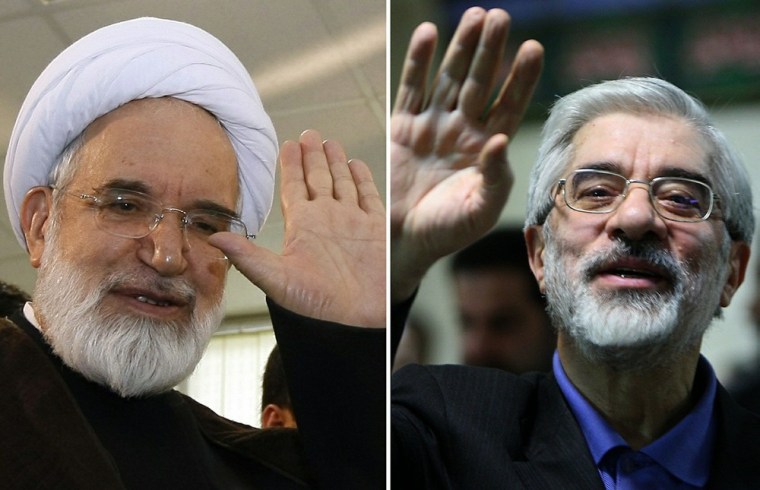Iranian lawmakers urged the judiciary on Tuesday to hand out death penalties to opposition leaders for fomenting unrest in the Islamic state after a rally in which one person was killed and dozens were wounded, state media said.
Clashes broke out between security forces and protesters when thousands of opposition supporters rallied in sympathy for popular uprisings in Egypt and Tunisia on Monday, reviving mass protests that shook Iran after a presidential vote in 2009.
"(Opposition leaders) Mahdi Karroubi and Mir Hossein Mousavi are corrupts on earth and should be tried," the official IRNA news agency quoted lawmakers as saying in a statement.
The loose term "corrupt on earth" — a charge which has been leveled at political dissidents in the past — carries the death penalty in the country.
The BBC reported that about 50 conservative lawmakers also marched through the parliament's main hall Tuesday, chanting "Death to Mousavi, death to Karroubi."
In Washington, U.S. President Barack Obama criticized the Iranian government for its harsh treatment of protesters.
"It's ironic that the Iranian regime is pretending to celebrate what happened in Egypt," Obama said. "They acted in direct contrast to what happened in Egypt" by using force against demonstrators.
Iranian authorities have repeatedly accused opposition leaders of being part of a Western plot to overthrow the Islamic system.

The claim has been denied by Mousavi, a former Iranian premier, and Karroubi, a former Iranian parliament speaker and leader of the National Confidence reformist party.
Parliament speaker Ali Larijani also accused the United States and its allies of providing support to the opposition.
"The main aim of Americans was to simulate the recent events in the Middle East in Iran to divert attentions from those countries," Larijani said, state radio reported.
Protests against Iran's clerical establishment appeared to have ended and life was back to normal in Tehran streets and other cities on Tuesday.
Wary of a repeat of the protests in 2009, which saw the biggest unrest since Iran's 1979 Islamic revolution, hardline rulers are expected to step up pressure on the opposition to prevent a new flare-up.
The last anti-government protest in Iran was in December 2009 when eight people were killed.
At least 20 pro-reform activists were arrested before the protests, opposition websites reported.
State television described protesters as "hypocrites, monarchists, thugs and seditionists."
A senior police official said dozens of protesters had been arrested and at least nine policemen were wounded by "hypocrites."
"We have information...that America, Britain and Israel guided the opposition leaders who called for the rally," said deputy police chief Ahmadreza Radan, the semi-official Fars news agency reported.
Iran's top authority Supreme Leader Ayatollah Ali Khamenei has called the uprisings in Egypt and Tunisia against secular, Western-allied rulers an "Islamic awakening," akin to the 1979 revolution that overthrew the U.S.-backed shah in Iran.
But the opposition say events in Tunisia and Egypt mirror their own protests after the June 2009 vote which they say was rigged to secure President Mahmoud Ahmadinejad's re-election. Authorities deny this.
The opposition leaders, who called the protest, were prevented by security forces from participating the rally, Mousavi's website Kaleme reported.
Amnesty International, Britain and the United States condemned the authorities' reaction to the protests.
Meanwhile, U.S. Secretary of State Hillary Clinton, in a major speech extolling Internet freedom on Tuesday, said there was a debate " about whether the Internet is a force for liberation or repression."
"But as the events in Iran, Egypt and elsewhere have shown, that debate is largely beside the point," she said. "The Internet isn't good or bad. It is both. It is neither. What matters is what people who go online do there, and what principles should guide us as we come together in cyberspace.
"Together, the freedoms of expression, assembly, and association online comprise what I have called the freedom to connect. The United States supports this freedom for people everywhere, and we have called on other nations to do the same."
The Obama administration will pump $25 million this year into helping cyber dissidents foil Internet repression, she added. The State Department, after launching Twitter accounts in Arabic and Farsi last week, will soon begin tweeting in Chinese, Hindi and Russian, she said.
Clinton said the U.S. was "convinced that an open Internet fosters long-term peace, progress and prosperity" but added the reverse "is also true."
"An Internet that is closed and fractured, where different governments can block activity or change the rules on a whim, where speech is censored or punished, and privacy does not exist, that is an Internet that can cut off opportunities for peace and progress and discourage innovation and entrepreneurship," Clinton said.
"There is no silver bullet in the struggle against Internet repression. There's no 'app' for that. And accordingly, we are taking a comprehensive and innovative approach, one that matches our diplomacy with technology, secure distribution networks for tools, and direct support for those on the front lines."